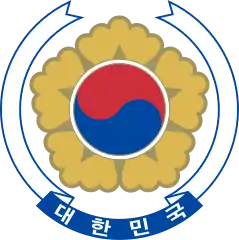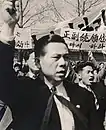1978 South Korean legislative election
Legislative elections were held in South Korea on 12 December 1978.[2]
| |||||||||||||||||||||||||||||||||||||||||||||
154 seats to the National Assembly with 77 Presidential appointees 78 seats needed for a majority | |||||||||||||||||||||||||||||||||||||||||||||
|---|---|---|---|---|---|---|---|---|---|---|---|---|---|---|---|---|---|---|---|---|---|---|---|---|---|---|---|---|---|---|---|---|---|---|---|---|---|---|---|---|---|---|---|---|---|
| Turnout | 77.1% ( | ||||||||||||||||||||||||||||||||||||||||||||
| |||||||||||||||||||||||||||||||||||||||||||||
| |||||||||||||||||||||||||||||||||||||||||||||
 |
|---|
|
|
The result was a victory for the ruling Democratic Republican Party, which won 68 of the 154 elected seats in the National Assembly, despite winning 169,000 fewer popular votes than the opposition New Democratic Party. With the addition of another 77 members appointed by President Park Chung-hee, the DRP had a supermajority. Voter turnout was 77.1%.
Results
| Party | Votes | % | Seats | +/– | |
|---|---|---|---|---|---|
| New Democratic Party | 4,861,204 | 32.82 | 61 | +9 | |
| Democratic Republican Party | 4,695,995 | 31.70 | 68 | –5 | |
| Democratic Unification Party | 1,095,057 | 7.39 | 3 | +1 | |
| Independents | 4,160,187 | 28.09 | 22 | +3 | |
| Presidential appointees | 77 | +4 | |||
| Total | 14,812,443 | 100.00 | 231 | +12 | |
| Valid votes | 14,812,443 | 98.60 | |||
| Invalid/blank votes | 210,927 | 1.40 | |||
| Total votes | 15,023,370 | 100.00 | |||
| Registered voters/turnout | 19,489,490 | 77.08 | |||
| Source: Nohlen et al. | |||||
By city/province
| Region | Total
seats |
Seats won | |||
|---|---|---|---|---|---|
| Democratic Republican | New Democratic | Democratic Unification | Ind. | ||
| Seoul | 22 | 9 | 11 | 1 | 1 |
| Busan | 10 | 4 | 5 | 0 | 1 |
| Gyeonggi | 16 | 8 | 7 | 0 | 1 |
| Gangwon | 10 | 5 | 3 | 0 | 2 |
| North Chungcheong | 8 | 3 | 4 | 1 | 0 |
| South Chungcheong | 14 | 7 | 5 | 0 | 2 |
| North Jeolla | 12 | 6 | 4 | 0 | 2 |
| South Jeolla | 20 | 8 | 7 | 1 | 4 |
| North Gyeongsang | 22 | 9 | 8 | 0 | 5 |
| South Gyeongsang | 18 | 8 | 7 | 0 | 3 |
| Jeju | 2 | 1 | 0 | 0 | 1 |
| Total | 146 | 68 | 61 | 3 | 22 |
References
- Park Chung-hee was the President and thus ineligible to run for the National Assembly.
- Dieter Nohlen, Florian Grotz & Christof Hartmann (2001) Elections in Asia: A data handbook, Volume II, p420 ISBN 0-19-924959-8
This article is issued from Wikipedia. The text is licensed under Creative Commons - Attribution - Sharealike. Additional terms may apply for the media files.
.jpg.webp)

